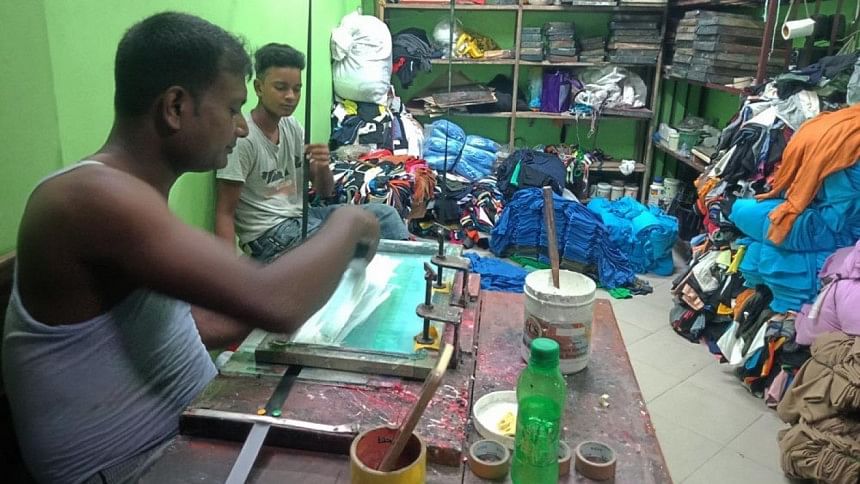Scrap-based apparel makers in trouble

Md Sharif Hossain, a small garment manufacturer, established a large-scale factory in Pabna sadar upazila a few years ago in a bid to manufacture apparel from garment scraps, locally known as "jhoot", and export to the Indian market.
Manufacturing clothes from garments waste, namely jhoot, presented a tremendous opportunity for small businesses in Pabna over the past three decades. As export facilities grew, businesses expanded into large-scale operations.
Sharif's business was running well for the past decade, but he suddenly closed down his factory last month due to a lack of buyers.
"I used to produce 15,000-16,000 dozen clothes each week. Over 100 workers operated 75 sewing machines in my factory. All of my products were supplied to the Indian market. Recently, Indian buyers are hardly coming due to a lack of marketing. I was bound to close my factory," Sharif said.
He used to supply three trucks laden with approximately 40,000 to 50,000 dozens of clothes to the Indian market each week.
Now, he is unable to sell one truckload a month.
Other manufacturers in the same line of work have been experiencing similar problems related to a lack of buyers.
"We used to manufacture 200 dozen clothes a week. Everything went to big traders and exporters for supplying to India. But now they are reluctant to take clothes since they have huge stocks," Md Nasim, another trader of Afuria village, said.
According to the Pabna Hosiery Manufacturing Group, garment products from jhoot used to bring in annual exports of around Tk 300-400 crore.
Now exports amount to around Tk 100 crore, all because the export business has expanded rapidly and in an unsystematic way, traders said.
"When traders got export facilities, many rushed to the manufacturing business without proper business plans. Most of these traders set up a few machines and started supplying clothes to merchants with export-import licences," Monir Hossain Popy, president of Pabna Hosiery Manufacturing Group, told The Daily Star.
At the beginning, hosiery manufacturers used to sell their products in the local market, but the t-shirts and various clothes are now being exported to India, Malaysia and other neighbouring and Asian countries.
"When export business was in full swing, most of the exporters opened letters of credit (LCs) for a small amount by showing low price of clothes. A majority of clothes are supplied through illegal channels to avoid customs duties. In this way, they reduced the price of our clothes in the international market," Popy said.
Popy used to be an exporter himself, supplying clothes to Indian buyers. But he left the business after not getting timely payments from buyers.
"Each truck has goods worth at least Tk 40 lakh. Everything is collected from small manufacturers in terms of deferred payment. But delays in receiving payment from foreign buyers cause trouble, so I left the business," Popy added.
There are over 1,000 small manufacturing factories in Pabna as well as over 200 big factories established in recent years targeting the export business.
Most of them are closed now, he added.
On the other hand, exporters blamed the reduced demand for such products on the Indian market and the global economic crises for poor sales.
"After the Covid-19 pandemic, the price of our local garment products reduced in the Indian market. Then we experienced huge losses. Now the demand has reduced in their markets as Indian buyers are buying jhoot from local markets," said Md Mojnu, an exporter who used to supply clothes through LCs.
"Due to repeated losses for the past two years, we are feeling the burden of bank loans. Most of the buyers have stopped coming to us," he said, adding that exports of jhoot, the essential raw material, must be stopped.
Speaking to The Daily Star, exporter Md Sharif claimed that many new businesses had entered the market when demand was at its peak. But they supplied substandard clothes, causing demand to fall.
He blamed the rush to catch buyers and the authority's lack of control for the fall of the export business. Despite its potential, the knit-manufacturing business from waste cloth is running without government support and an organised monitoring system.
When visiting AR Corner, the biggest hub of garments products, most of the shops were found to be closed due to a lack of buyers. The few open shops were dependent on local buyers while there were huge amounts of unsold clothes in factory storage.
"We have no foreign buyers. We can hardly get buyers from other districts. We are dependent on local buyers, so sales have reduced by 50-60 percent," said Md Sohel Hossain, a hosiery trader.

 For all latest news, follow The Daily Star's Google News channel.
For all latest news, follow The Daily Star's Google News channel. 



Comments